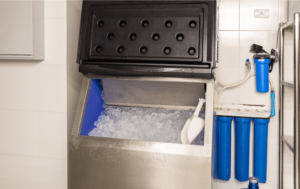
A Guide to Regular Maintenance for Your Commercial Ice Machine
Keeping your commercial ice machine in top condition is crucial for any business in the service industry. Not only does it ensure a constant supply of ice for your customers, but it also maintains the quality of the ice you serve. Regular maintenance is the key to the longevity and reliability of your equipment. Here’s how to keep your ice machine running smoothly and efficiently:
Understanding Your Ice Machine
Before diving into maintenance, it’s important to understand the type of ice machine you have and its specific needs. Review the manufacturer’s manual for any particular instructions or recommendations.
A commercial ice machine is a significant investment for any business in the service industry, and it’s vital to understand that not all machines are created equal. Various models come with different features, production capacities, and maintenance needs. Here’s a closer look at the factors that can affect maintenance requirements:
Type of Ice Machine
- Modular Units: These machines produce large amounts of ice and are typically paired with separate storage bins. They may require more frequent cleaning due to their capacity and usage levels.
- Undercounter Units: Smaller and more compact, these are used in establishments with limited space. They often have simpler maintenance routines due to their size but still require regular attention to ensure functionality.
- Countertop Dispensers: Often found in self-serve areas, these units have intricate mechanisms for dispensing ice and water. This complexity means they can be more susceptible to wear and require careful, routine checks.
Ice Type
- Cube Ice Machines: They tend to be more straightforward in design, but the size and shape of the ice can affect how quickly mineral buildup occurs within the machine.
- Nugget and Flake Ice Machines: These machines have more intricate internal mechanisms to create softer, chewable ice, which may require more detailed cleaning around the auger and evaporator.
Water Quality
- Hard Water Areas: In areas with hard water, machines are more prone to scale buildup and may need more frequent descaling and filter changes to combat mineral deposits.
- Filtered Water Systems: Machines using pre-filtered water can often go longer between deep cleanings, but they still require regular maintenance to ensure the filters are working correctly.
Ambient Conditions
- Temperature: Machines in hotter climates or near heat-producing equipment will work harder to produce ice, potentially leading to more frequent service needs.
- Air Quality: High levels of dust or grease in the air can clog up filters faster and will necessitate more regular cleaning of air intake and exhaust areas.
Usage Patterns
- High-volume Venues: Bars, restaurants, or event spaces that use a lot of ice may need more frequent maintenance due to the sheer volume of ice produced and the continual opening of bins.
- Seasonal Use: Machines that see more use during certain times of the year, such as ice machines in seasonal resorts, might require pre- and post-season servicing in addition to regular maintenance.
Brand and Model Specifics
- Manufacturer’s Guidelines: Each brand and model will have its own specific maintenance guide. Some machines have built-in cleaning cycles and indicators to help maintain them.
- Warranty Requirements: Some warranties are conditional on following a strict maintenance schedule, which can differ from one manufacturer to another.
Understanding the specific maintenance needs of your commercial ice machine is essential for optimal performance. Regularly referring to the owner’s manual and staying attuned to the machine’s performance will alert you to potential issues before they become significant problems. When in doubt, consult with a professional technician who can provide tailored advice and service to your particular model, ensuring that your ice machine remains a reliable asset in your daily operations.

Daily Cleaning Tasks
Maintaining the hygiene and functionality of your commercial ice machine requires daily cleaning tasks. These routine actions can prevent the buildup of bacteria and mineral deposits, ensuring the machine operates efficiently and the ice produced is safe for consumption.
Exterior Cleaning
Every day starts with a clean slate—or, in this case, a clean machine. Wipe down the exterior surfaces of the ice machine with a clean, damp cloth to remove dust, dirt, and any potential contaminants. After the wipe-down, a food-safe sanitizer should be applied to these surfaces, with particular attention to areas that come into frequent contact with staff, such as handles and levers.
Interior Cleaning
A closer look inside the machine is just as important. The interior areas like the inside of the door, the ice chute, and the ice storage bin need attention. Using a soft cloth along with warm water and a mild detergent, you should clean these areas gently, followed by a thorough rinse. Afterward, the interior surfaces where ice is formed and stored should be sanitized according to the manufacturer’s guidelines to ensure safety and cleanliness.
Ice Storage Bin
When it comes to the ice storage bin, if the design allows, empty it daily and use a sanitized cloth to wipe down the interior to remove any lingering water or ice flakes that could be a breeding ground for bacteria.
Air Filter
For those machines equipped with an air-cooled condenser, the air filter is a line of defense that needs regular checks. Any dust or grease buildup should be cleared to keep the airflow unobstructed and the cooling process efficient.
Water Filter
Although a water filter may not require daily replacement, a quick examination to ensure it’s not clogged will keep the water flow steady and the ice quality high.
Detachable Parts
Detachable components, such as the ice scoop, should be washed with hot, soapy water, rinsed, and thoroughly dried on a daily basis. If they’re dishwasher safe, they can be cleaned in the dishwasher for convenience.
Inspection
An overall inspection can save you from future headaches. Look out for ice that’s clumping together—this could indicate a temperature issue. Also, keep an ear out for any unusual sounds from the machine that could point to potential mechanical issues.

The Importance of a Daily Clean
Why bother with a daily clean? For starters, ice is a food product, and like any other food, it must be protected from contamination. A clean ice machine is an efficient one, not only using less energy but also ensuring the longevity of your equipment. It’s the consistency in your maintenance routine that guarantees consistency in your ice quality. And lastly, routine maintenance keeps the moving parts in good condition, potentially saving you from costly repairs in the future.
By integrating these cleaning practices into your daily operations, you will ensure that your commercial ice machine continues to be a reliable asset in your business, producing safe, quality ice for your customers and maintaining optimal functionality. Always remember to consult your machine’s user manual for the most accurate and specific maintenance guidance.
The Weekly Sanitization Process
Weekly sanitization of your commercial ice machine is a critical step in maintaining the machine’s cleanliness, ensuring the health of your customers, and extending the life span of your equipment. While daily cleaning is vital for the machine’s exterior and readily accessible parts, weekly sanitization focuses on the deeper cleaning of the internal components where pathogens and scale can accumulate over time.
Ice Making Compartment
Begin with the ice-making compartment. This is where the water freezes into ice, and it’s crucial to remove any mineral scale to maintain the efficiency of the ice-making process. Many manufacturers provide a recommended cleaning solution that is designed to both sanitize and remove the mineral buildup. This solution should be used according to the specific instructions provided for your machine. Ensure that the area is well-rinsed with water after the cleaning process to prevent any cleaner from contaminating the ice.
Storage Bin and Dispenser
Moving on to the storage bin and dispenser, these areas need thorough attention. Any removable parts should be taken out and cleaned separately with a sanitizing solution. The interior surfaces should also be scrubbed with the solution, which will typically need to be left on the surface for a specified period to effectively kill any bacteria or mold.
Removable Components
All removable components, such as ice scoops, trays, or curtains, should be soaked in the sanitizing solution. Once they have been properly sanitized, ensure that these parts are rinsed with clean water, dried, and then reassembled correctly.
Water Filtration System
The water filtration system, though not always needing weekly attention, should be checked to ensure it is functioning correctly and does not need a filter change or any other maintenance.
Internal Water System
The internal water system, including hoses and reservoirs, should be flushed with a sanitizing solution to prevent any biofilm from forming within the system. This not only ensures that the ice is free from contamination but also helps maintain the flow and pressure of water that is crucial for ice production.
Final Rinse and Inspection
After the sanitization, a final thorough rinse with clean water is mandatory to ensure no residue of the cleaning solution remains. Once the machine is reassembled, it’s beneficial to run a couple of cycles and discard the ice made during these cycles to ensure that any possible residue is completely removed.
Record Keeping
It’s a good practice to keep a log of your cleaning and sanitization schedule. This not only helps in maintaining regular maintenance but also provides a record that can be useful during health inspections or maintenance checks.

Regular weekly sanitization is a best practice that will help keep your ice machine in peak condition. This commitment to cleanliness reflects your dedication to quality service and customer health, all while safeguarding your investment in your ice machine. Remember, the longevity and reliability of your equipment, and the safety of the ice you produce, are directly linked to your sanitization efforts.
Monthly Deep Cleaning
Monthly deep cleaning of your commercial ice machine is an essential practice for ensuring that your machine operates efficiently and the ice it produces remains pure and safe for consumption. This process is more intensive than daily and weekly cleaning and often requires a bit more time and effort to address areas that are prone to scale, mold, and slime buildup over time.
Inspection and Preparation
To begin your monthly deep cleaning, it is advisable to start with a thorough inspection of the ice machine to identify any areas that need special attention. Ensure the machine is turned off and disconnected from the power source before attempting any deep cleaning processes.
Descaling and Sanitizing Agents
A descaling agent is used to remove hard water mineral deposits that can build up inside the machine. Follow the manufacturer’s instructions for the appropriate descaling agent for your specific ice machine. After descaling, all internal surfaces should be treated with a sanitizing agent that is safe for ice machines. This will help to eliminate any microbial growth that may have developed.
Cleaning the Evaporator
The evaporator is where the refrigeration cycle happens and is crucial for the ice-making process. A clean evaporator not only ensures proper ice formation but also enhances the machine’s efficiency. Some machines will have nickel-plated evaporators that require a specific type of cleaner, so it’s important to use the correct cleaning agents to avoid damaging the component.
Water System Flush
The water system should undergo a complete flush. Replace any water filters to ensure that the water used in ice production is free from impurities and odors. Filters play a significant role in preventing scale and maintaining the taste and quality of the ice.
Inspecting Seals and Gaskets
Monthly maintenance is also the time to inspect seals and gaskets around the doors and access points of the ice machine. These areas can harbor bacteria and mold if not sealed properly. Replace any seals that show signs of wear or damage to maintain optimal cleanliness.
Condenser and Air Filter Cleaning
The condenser and air filters should not be neglected, as they are vital to the machine’s operation. Clean the condenser with a brush or vacuum to remove any dust and lint that can impede airflow. Wash or replace air filters as needed to ensure efficient operation.

Seasonal Checks
- Inspect Water Filters: Replace water filters every six months or as recommended by the manufacturer to prevent scale and maintain water quality.
- Check Seals and Gaskets: Inspect the door seals and gaskets for wear and tear to keep the cold air in and warm air out.
Annual Professional Service
- Schedule Inspections: Even with diligent maintenance, it’s wise to have a professional technician inspect and service your ice machine annually. They can check for issues you may not be equipped to notice, such as refrigerant levels or mechanical wear.
Trouble Signs to Watch For
- Changes in Ice Quality: If the ice starts to come out cloudy, small, or malformed, it could indicate a need for cleaning or that there are mechanical issues.
- Slow Ice Production: A decrease in the rate of ice production could suggest a clogged water line or other problems that need attention.
The Impact of Neglect
Failing to maintain your commercial ice machine can lead to a host of problems, including:
- Health Code Violations: Dirty or malfunctioning machines can become health hazards, attracting the attention of health inspectors.
- Increased Operating Costs: Ice machines that aren’t cleaned regularly have to work harder, using more electricity and requiring more frequent repairs.
- Shorter Equipment Life: Like any machine, a lack of care will shorten the lifespan of your ice machine, leading to costly replacements.
Regular maintenance of your commercial ice machine isn’t just about following a schedule; it’s about ensuring the safety, efficiency, and longevity of an essential piece of equipment in your service industry business. By adhering to these guidelines, you can ensure that your machine continues to produce high-quality ice, contributing to the overall customer experience. Remember, an ounce of prevention is worth a pound of cure, especially when it comes to the smooth operation of your business.
Should you find yourself considering the investment in a new commercial ice machine, remember that at Ice Maker Depot, we are committed to helping you make the best choice for your business needs. We provide competitive quotes and expert advice to guide you to the right selection. Let us help you get started on a refreshingly clear choice for your business today.
